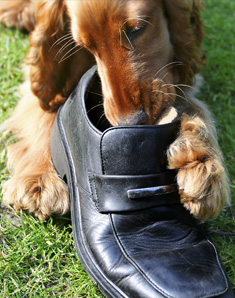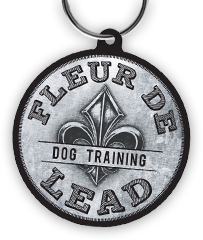Chewing

Dogs chew for a variety of reasons.
The main ones are teething, boredom, and separation anxiety. Puppies between four to six months of age chew because they are teething and chewing helps to ease their gum discomfort. You must provide your puppy with appropriate items to chew, and confine him to areas where there are no tempting objects such as sneakers, socks, children’s toys, or any other household objects.
Using a crate or baby gates are good ways to keep your puppy confined and keep the puppy safe from harmful items to chew, as well as protect your home from an eager puppy’s teeth! It is unfair to expect your puppy to know what he cannot chew if you allow him free run of your house and access to all of your personal items. If you use a crate make sure that you give your puppy some safe, durable chew toys to chew on while he is in his crate.
Excellent examples of chew toys for your puppy are Nylabones, sterilized bones, durable, hollow rubber toys like Kongs stuffed with a little bit of peanut butter, biscuits, yogurt, or other food items that are good for your puppy. If you have a puppy that is an aggressive chewer, avoid items such as rawhide or cow hooves. Dogs with powerful jaws can break up large bits of these items and swallow them, causing stomach obstructions and possible surgery to remove them.
Puppies experience pain in their gums as they lose their baby teeth and their adult teeth come in. You can give them ice cubes to chew on, which will help numb the painful feeling in their gums and jaw. You can also make “chicksicles” by putting some chicken broth in your ice cube tray.
Teach your puppy what toys are appropriate for him to chew on. When the puppy attempts to chew on something unacceptable, remove the object from the puppy’s mouth, and then give the puppy an acceptable toy to chew on. Praise the puppy when he starts to chew on the acceptable toy. You can use the same technique with an adult dog that you have just adopted. You can also teach your dog a “leave it” command to let go of objects, and it can be particularly useful when you walk your dog outside, as many dogs will tend to pick up less than desirable objects on the street like cigarette butts and trash.
Adult dogs who are bored will chew to give themselves something to do during the day when you are not at home, or in the evenings when you are home and not interacting with the dog. Exercising your dog regularly can assist with ending destructive chewing, as a tired dog is a happy dog. Giving your dog an outlet to expend his pent-up energy is an excellent way to eliminate destructive behaviors, as a well-exercised dog will most likely want to relax and sleep in your home instead of finding things to chew on to work out his frustrations. There are some excellent toys as well to provide your dog with mental stimulation when you are not home. Invest in some durable “dog puzzles”, such as the Buster Cube and the Kong. A Buster Cube is a hollow cube that you can fill with kibble or other treats, and the dog must figure out how to roll the cube around to get the treats. You can even feed your dog his or her breakfast in this way, as it will take the dog quite some time to get all the kibble out and help him to expend energy in a positive, fun way. Kongs are another toy that you can stuff with food and provide to your dog while you are either not at home, or preoccupied with household tasks. An expertly packed Kong full of food can be a challenging task for your dog and provide exercise for the dog’s gums and jaws as well.
